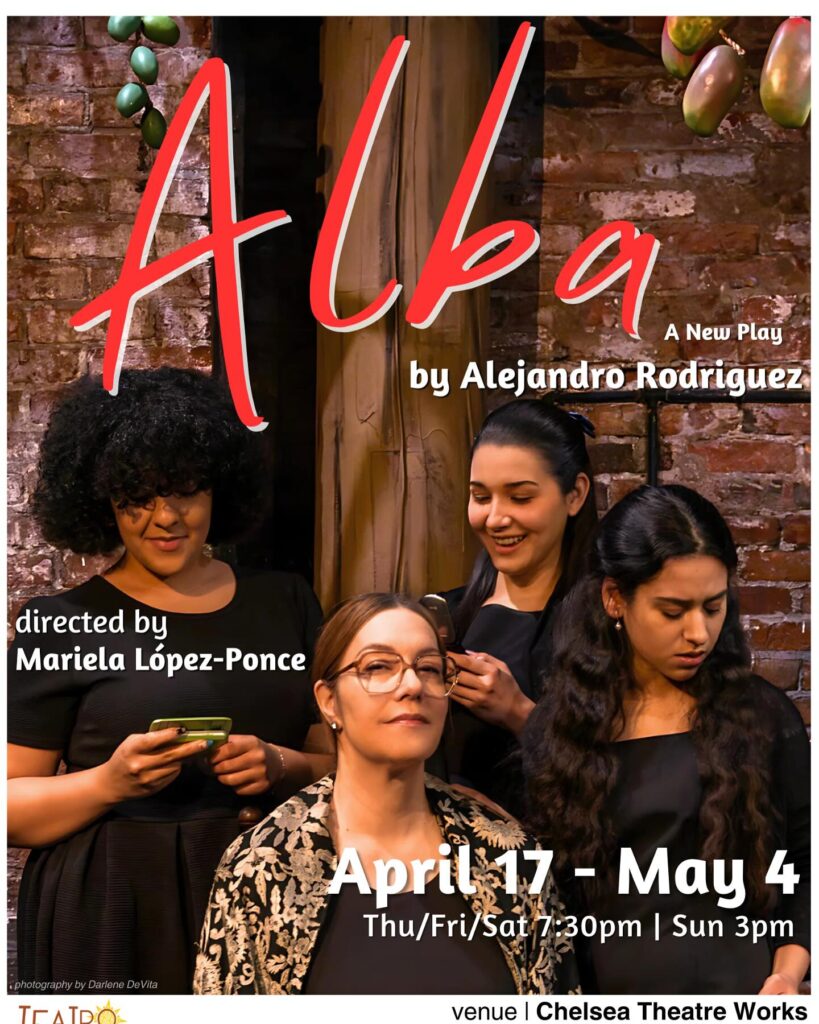
Presented by Teatro Chelsea
A new play by Alejandro Rodriguez
Based on The House of Bernarda Alba by Federico García Lorca
Produced & directed by Mariela Lopez-Ponce
April 17-May 4, 2025
Chelsea Theatre Works Black Box
181 Winnisimmet Street
Chelsea, MA 02150
Critique by Kitty Drexel
CHELSEA, Mass. — Alba, currently running at the Chelsea Theatre Works black box through May 4, is a modern adaptation of Federico Garcia Lorca’s 1945 classic The House of Bernarda Alba. Playwright Alejandro Rodriguez spins Lorca’s play by adding a narrator, a male Poet, to a play originally written for 12 women and one child. Rightly or wrongly, this adaptation provides the male perspective on the relationships between women in a family free of men.
Alba shows us toxic femininity through the lens of modesty culture. In it, severe matriarch Alba (Elisa Guzman-Hosta) and her three daughters mourn the passing of their patriarch, Alba’s second husband, who has left them deeply in debt. We meet them on the sweltering day of the funeral in Miami, Florida. Alba’s sister Yolanda (Paola Ferrer sparkling in yet another role at Chelsea Theatre Works) and hospice nurse Gladys (Carmen Serrato, who is underutilized in this production) prepare the house to receive guests. Alba’s mother Josefina (Ines de la Cruz) cries out from her bedroom for attention. Alba warns them all that they will abstain from socializing or going out until she is ready to release them from the strictures of mourning.
Each daughter copes with Alba’s stifling demands of chastity, modesty, and discipline in their own way. Youngest daughter, Adela (Amber Nicole Rodriguez), pushes boundaries by dressing provocatively. Middle child, Amelia (Luz Lopez), loses herself in her studies. The eldest daughter, Angie (Jessibel Falcon), who has inherited a large sum of money from Alba’s first husband, finds solace in the Catholic church. Angie is engaged to Roman, a neighbor’s son and known profligate scrub. The entire family unit is fascinated by their unlikely match. As the story unfolds, the young women push harder against Alba’s harsh rules and each other’s sisterly meddling. Ricardo Holguin plays the unnamed, mysterious Poet.
Alba’s script is wonky. Rodriguez’s female characters aren’t relatable to human women; they come across as women written by a man who hasn’t spent enough time with women. This play is funny and it’s sad, but it isn’t true to women’s experiences. Yet.
Further, as written, Alba behaves as a treatise on women’s personhood. The Poet tells us about growing up in a family of women as the only male. As he ages, he realizes his mother, grandmother, and aunts are more than just his caregivers; they are people, too. The Poet’s public realization (with no shade to Holguin, who is clearly working hard) is immensely frustrating. It’s 2025. Do we really need a man to write a play about a man coming to understand that women are people for men to accept we’re people? I acknowledge that this is likely not Rodriguez’s intent, but it is where my thoughts wandered after the performance. Great discoveries can be found in a modern adaptation of a play, but the audience needs to clearly understand why an adaptation is necessary. What are we learning from this adaptation? “Women are people now” shouldn’t be enough to justify an adaptation.
Despite these frustrations, Teatro Chelsea’s production has good bones. The cast nails the script’s comedic moments and finds truth in the play’s drama. Guzman-Hosta is a stern mother, and she finds moments of tenderness between her lines to portray Alba as a scared woman protecting her daughters. Ferrer, Serrato, and de la Cruz dance around Guzman-Hosta as character foils to compare and contrast the choices Alba has made.
The three sisters, Rodriguez, Falcon, and Lopez create sympathetic tension in their roles. They successfully convey their characters’ high stakes by making strong choices. Even if it is just for the chickens, Rodriguez wears the heck out of her green dress despite her mother’s warnings. Lopez makes Amelia calculatingly intelligent; she understands more than her mother sees. De la Cruz’s Angie simmers with unspoken desperation for change. I’d argue the sisters could lean even harder into their choices (with Lopez-Ponce’s permission) and find more small moments when the sisters connect with each other as they battle Mom: affectionate touches, knowing glances only the audience will notice, inside jokes. The audience will get to see more of the work you’re already doing onstage.
Lastly, the pacing drops between the women’s scenes and the Poet’s scenes. The Poet starts the show with a slow but even introspective monologue. In a scene introducing Yolanda and Gladys, the pacing speeds up dramatically, only for it to drop again when the Poet reenters. It could give a person whiplash.
Apologies for the abrupt ending of this article. The U.S. President (FOTUS) and his cabinet of lying fascists believe they are above the law. Bezos sent Katy Perry to space but won’t use his billions to feed hungry people. DOGE has decimated the National Endowment for the Humanities. I don’t have a smooth conclusion at my disposal, and y’all have already waited too long for this article.
